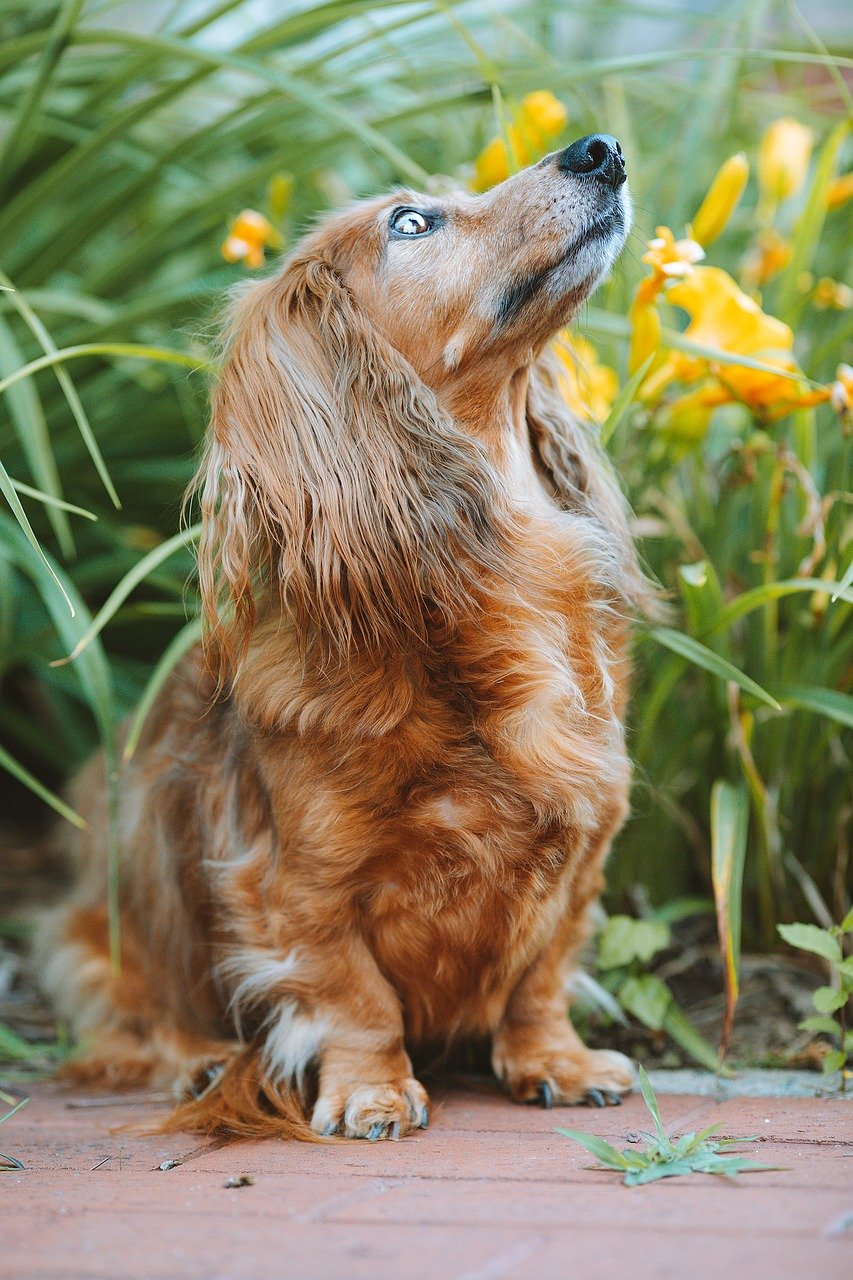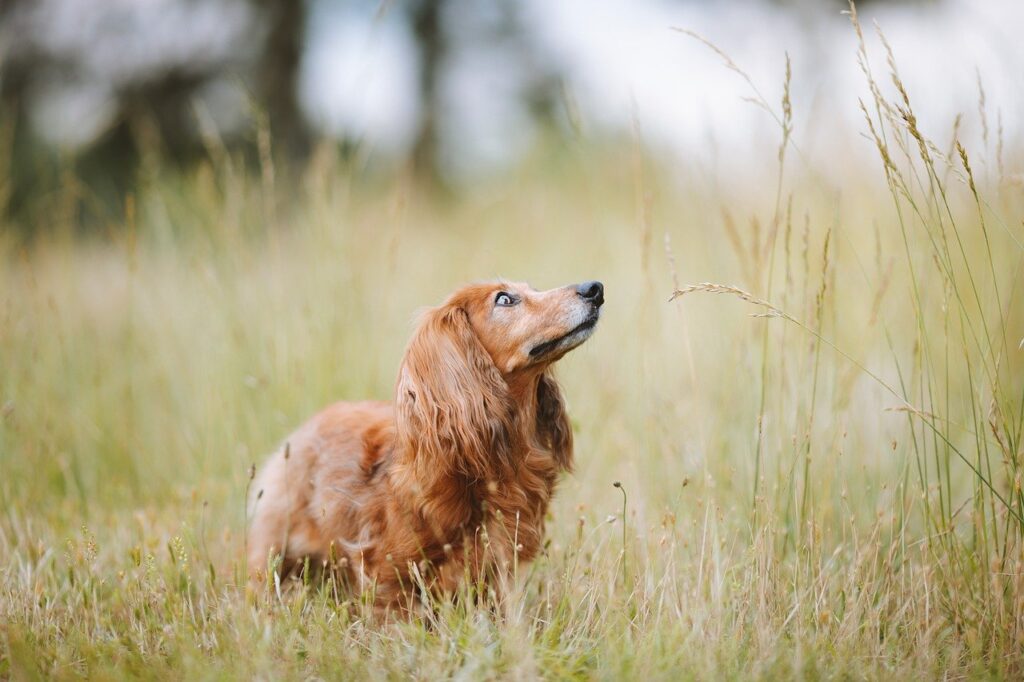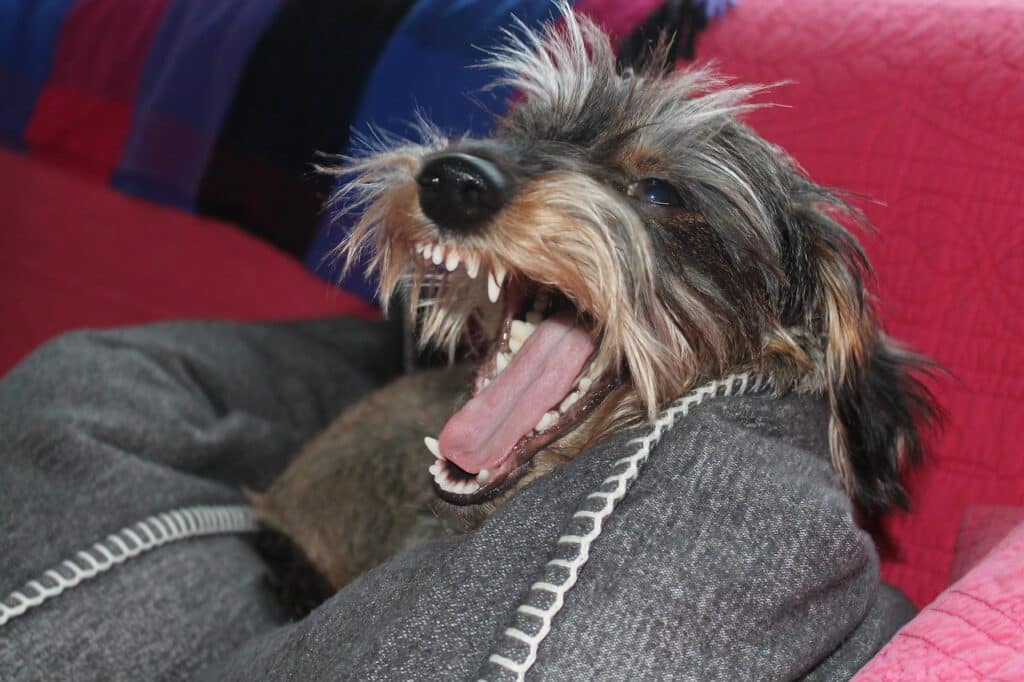Thinking about welcoming a Long Haired Dachshund into your life? These charming companions, often nicknamed “doxies,” can bring endless joy with their playful spirit and affectionate nature. However, before you fall head over heels for those adorable floppy ears and soft fur, there are some key things to consider.
This first part of the article serves as an introduction to the breed, sparking the reader’s interest and highlighting the Dachshund’s endearing qualities. It also subtly introduces the idea of some important factors to consider before adoption.

History: From Badger Hunter to Beloved Companion
The Long Haired Dachshund boasts a rich and intriguing past. These lovable companions originated in Germany, bred specifically for their prowess in hunting. Their elongated bodies with short legs were perfectly suited for digging into dens and flushing out badgers and other small prey.
Nicknamed “doxies” or “sausage dogs,” these feisty hunters were prized for their courage and determination. Over time, the Long Haired Dachshund transcended its working roots and transitioned into a cherished companion animal. Their distinctive appearance, characterized by the long, flowing coat and those endearingly short legs, coupled with their playful personalities, captured the hearts of dog lovers worldwide. Today, Long Haired Dachshunds remain popular family pets, bringing joy and entertainment to homes around the globe.
Keeping Your Long Haired Dachshund Safe and Happy
Adopting a Long Haired Dachshund is an exciting adventure, but it comes with the responsibility of providing proper care for your furry friend. Understanding their specific needs is crucial for their well-being.
This section will delve into everything you need to know to ensure your Dachshund thrives, from essential grooming routines to potential health concerns. We’ll also explore helpful tips for training and keeping your lively pup safe and secure.
By investing in a GPS-enabled dog collar, you can gain peace of mind knowing you can track your Dachshund’s whereabouts and set up safe zones (geofences) to receive alerts if they wander outside designated boundaries. Several reputable brands offer GPS collars with a variety of features, so do your research to find one that best suits your needs and budget.
This revision removes the specific brand name and focuses on the general benefits of GPS collars for Dachshunds. It also encourages readers to research different brands for the best fit.
A Spirited Companion: Temperament and Training
Long Haired Dachshunds are renowned for their zest for life. These playful pups are incredibly loyal and affectionate, forming strong bonds with their families. They thrive on companionship and enjoy being included in daily activities. However, their independent streak and stubborn side can sometimes surface, requiring patience and consistent training.
Early socialization is vital for Long Haired Dachshunds. Exposing them to different people, animals, and environments from a young age helps them develop into well-rounded and adaptable companions.
Positive reinforcement training methods are key to unlocking their intelligence and willingness to please. Remember, Dachshunds are smart and can be quite mischievous, so providing them with mental stimulation and engaging activities will help prevent boredom and potential behavioral issues. With patience, consistency, and a healthy dose of humor, you can establish yourself as a respected leader and build a strong, rewarding relationship with your Long Haired Dachshund.

Welcoming Your Long Haired Dachshund: Preparation is Key
Bringing a Long-Haired Dachshund into your life is an exciting event, but a little preparation goes a long way in ensuring a smooth transition for both you and your furry friend.
Gearing Up: Before your pup arrives, gather some essential supplies to create a comfortable and stimulating environment. This should include:
- A comfy bed or crate: Provide a designated space for your Dachshund to sleep and feel secure. A crate can be particularly helpful for house-training.
- Food and water bowls: Choose bowls that are the right size and easy for your dog to access. Stainless steel or ceramic bowls are a good option.
- High-quality dog food: Consult your veterinarian to choose a puppy food formulated for small breeds.
- Grooming supplies: A brush suitable for their coat length, nail clippers, and dog shampoo will help you maintain their hygiene.
- Toys: Provide a variety of toys to keep your Dachshund entertained, both for playtime and mental stimulation. Opt for durable toys appropriate for their size and chewing habits.
- Leash and collar or harness: Choose a comfortable leash and a well-fitting collar or harness for safe walks and adventures.
Puppy-Proofing Your Castle: Long Haired Dachshunds are curious and love to explore. Puppy-proofing your home is crucial to prevent accidents and ensure their safety. Here’s what to consider:
- Secure electrical cords and wires.
- Put away any small objects or toxic substances that could be chewed on or ingested.
- Anchor trash cans and eliminate potential hazards on countertops.
- Block access to tight spaces where they could get stuck.
Find a health partner for your puppy: regular veterinary care is essential for your dachshund’s health. Find a reputable vet in your area before your puppy arrives. Make an appointment for an initial physical examination, check your puppy’s health and discuss any questions you may have.
These steps will ensure a safe and cosy environment for your longhaired dachshund and a happy and fulfilling life together.
Finding Your Perfect Match: Selecting the Right Long Haired Dachshund
So you’ve identified reputable breeders or rescue organizations, and now comes the exciting part – choosing your furry companion! While each Long Haired Dachshund possesses a unique personality, here are some key factors to consider when making your selection:
Temperament Matters Most
Pay close attention to the temperament of the puppies or adult dogs available. Ideally, you want to find a dog that complements your lifestyle and personality. If you lead an active life, a more energetic pup might be a great fit for your daily walks and adventures. On the other hand, a calmer dog might be better suited for a quieter household. Spend time observing the interactions between the dogs and their caregivers. Are they playful and outgoing, or more reserved and observant? Look for signs of socialization and comfort in human interaction.
Considering Age
Think about whether you’re prepared for the commitment of a puppy or if an adult dog might be a better fit for your lifestyle. Puppies require a significant amount of time, attention, and training, including housebreaking and basic obedience. Adult dogs may already be trained and socialized, but they could also have established habits or quirks that require patience and understanding. Consider your living situation and daily routine when making this decision.
Gender Preferences
Decide whether you have a preference for a male or female Long Haired Dachshund. While temperament may vary slightly between individual dogs, there are generally no significant behavioral differences between the sexes. Some people might have a preference based on personal experience or living situation. Focus on finding a dog whose personality aligns well with yours.
Alluring Appearances
While appearance shouldn’t be the deciding factor, it’s certainly understandable to have preferences. Long Haired Dachshunds come in a delightful variety of colors and coat patterns, including cream, black, red, and brindle, with various markings and combinations. Think about the colors and patterns that appeal to you most.
Ultimately, the best way to choose the right Long Haired Dachshund is to spend time interacting with the available dogs and letting your intuition guide you. A responsible breeder or rescue organization will allow you ample time to meet the dogs and ask questions. Trust your gut feeling and choose the pup whose personality and temperament resonate most with you. This connection will form the foundation of a loving and rewarding relationship for years to come.

Building a Well-Behaved Companion: Training Your Long Haired Dachshund
Long Haired Dachshunds, with their independent streak, can present a slight challenge in the training department. However, with patience, consistency, and the right approach, you can establish a strong bond and a well-mannered canine companion.
- Early Intervention is Key: The window of opportunity for successful training opens wide during puppyhood. Start training your Dachshund as soon as they come home, focusing on basic commands like “sit,” “stay,” and “come.” These fundamental commands form the foundation for a well-behaved dog.
- Consistency is the Cornerstone: When training your Dachshund, consistency is paramount. Ensure everyone interacting with your pup uses the same commands and training methods. Mixed signals can confuse your dog and hinder progress.
- Positive Reinforcement: The Key to Success: Long Haired Dachshunds thrive on positive reinforcement. Reward your pup with praise, treats, or playtime whenever they obey a command correctly. This positive association motivates them to learn and makes training an enjoyable experience for both of you.
- Patience is a Virtue: Remember, training takes time and patience. Every Dachshund learns at their own pace. Don’t get discouraged if your pup doesn’t master a command immediately. Consistent, positive training sessions will eventually lead to success.
Beyond the Basics: In addition to basic commands, consider enrolling your Dachshund in obedience classes. This provides a structured learning environment and allows them to socialize with other dogs. Dachshunds can also excel in activities like agility training, which challenges their minds and bodies and strengthens your bond.
Keeping Your Long Haired Dachshund Thriving: Essential Care
Providing proper care is vital for ensuring your Long Haired Dachshund lives a long, happy, and healthy life. Here are some key aspects to keep in mind:
Maintaining a Luxurious Coat
Long Haired Dachshunds require regular grooming to prevent matting and keep their fur healthy. Brushing their coat at least once a week is recommended, removing loose hair and debris. You may need to brush them more frequently during shedding seasons. Invest in a high-quality brush suitable for their coat length. Regular nail trims are also important to prevent discomfort and potential damage to your floors or furniture. Bathing should be done as needed, typically every 4-6 weeks, using a gentle dog shampoo formulated for their sensitive skin.
Exercise for a Happy Pup
Don’t let their short legs fool you! Long Haired Dachshunds are surprisingly energetic and require regular exercise to burn off steam and stay mentally stimulated. Aim for at least one daily walk, allowing them to explore their surroundings and engage in sniffing adventures. Playtime sessions throughout the day are also essential for these lively companions. Interactive games, fetch, or puzzle toys can help keep their minds and bodies active. Remember, a tired Dachshund is a well-behaved Dachshund!
Fueling Their Adventures
Providing your Long Haired Dachshund with a balanced, high-quality diet is crucial for optimal health. Consult your veterinarian to choose a food specifically formulated for small breeds. Portion control is important, as Dachshunds can be prone to obesity. Be mindful of treats and table scraps, as these can contribute to weight gain. Fresh, clean water should always be readily available.
Follow these basic care points and your Longhair Dachshund will thrive for many years to come and bring joy into your life.

Engaging the Mind: Mental Stimulation for Long Haired Dachshunds
Just as physical exercise is crucial for your Long Haired Dachshund’s well-being, so too is mental stimulation. A bored Dachshund can become destructive or develop behavioral problems. Here are some ways to keep your pup’s mind active and engaged:
Interactive Playthings
Invest in a variety of interactive toys and puzzles. These can be food-dispensing toys that require your Dachshund to problem-solve to access treats, or puzzle toys that challenge them to manipulate levers or move pieces to reveal hidden rewards. Interactive playthings not only keep them entertained but also stimulate their cognitive skills and natural problem-solving abilities.
Training Time Fun
Regular training sessions are a fantastic way to provide mental stimulation for your Long Haired Dachshund. Teaching them new tricks or reinforcing old commands keeps their minds sharp and strengthens the bond you share. Positive reinforcement training methods, using praise, treats, or playtime as rewards, make training sessions enjoyable and engaging for both you and your pup.
Expanding Their Horizons
Consider introducing your Dachshund to various canine enrichment activities. Scent work, where they use their keen sense of smell to track hidden objects, can be a stimulating and rewarding activity. Dog sports, such as agility courses or rally obedience, provide physical exercise and mental stimulation while also fostering teamwork and communication between you and your dog. There are even options like doggy yoga, designed to promote relaxation and focus through gentle stretches and movements. Explore these activities and find what sparks your Dachshund’s interest, keeping their minds and bodies active and engaged.
Building Confidence Through Socialization
Proper socialization is crucial for your Long Haired Dachshund’s development. Exposing them to new experiences and interactions during their formative puppyhood helps them become well-adjusted and confident canine citizens.
Expanding Their Horizons
Introduce your Dachshund to a variety of people and animals from a young age. This could involve arranging playdates with other friendly dogs, supervised interactions with children, or casual greetings with strangers during walks. Positive experiences during these encounters help them develop social skills and reduce the likelihood of fear-based reactions later in life.
Puppy Playdates
Puppy socialization classes offer a safe and controlled environment for your Dachshund to learn proper doggy etiquette and interact with other pups of similar age and play styles. Look for classes led by experienced trainers who utilize positive reinforcement methods. These classes not only benefit your pup’s social development but also provide valuable training guidance for you.
Exploring the World
Venture beyond your usual routine and take your Dachshund to new environments. Parks, pet stores with designated dog areas, or outdoor cafes with dog-friendly patios can provide opportunities for them to experience different sights, sounds, and smells. Always prioritize their safety and comfort during these outings. Rewarding calm and well-behaved interactions with praise and treats helps reinforce positive associations with new situations.
Understanding Potential Health Concerns
As with all breeds, Long Haired Dachshunds can be predisposed to certain health issues. Being aware of these potential concerns allows you to be proactive in preventive care and work closely with your veterinarian to ensure your pup’s well-being. Here are some common health conditions to watch for in Long Haired Dachshunds:
Intervertebral Disc Disease (IVDD)
This is a serious condition affecting the spine. Their elongated bodies make Dachshunds more susceptible to IVDD, which can cause pain, paralysis, and other neurological problems. Careful handling, avoiding jumping from high places, and maintaining a healthy weight can help reduce the risk of IVDD. If you notice any signs of back pain, weakness, or difficulty walking, consult your veterinarian immediately.
Obesity
Dachshunds, with their short legs and love for food, can easily become overweight. Obesity not only strains their backs but also increases the risk of other health problems like diabetes and joint issues. Portion control, regular exercise, and avoiding table scraps are crucial for maintaining a healthy weight for your Dachshund.
Dental Issues
Dental disease is a common concern among dogs, and Long Haired Dachshunds are no exception. Regular brushing with a dog-safe toothpaste, along with professional dental cleanings recommended by your veterinarian, can help prevent plaque buildup and gum disease.
Epilepsy
Some Long Haired Dachshunds may be predisposed to epilepsy, a neurological disorder causing seizures. If you notice your dog experiencing seizures, consult your veterinarian immediately to establish a proper diagnosis and treatment plan.
Preventive Care is Key: Regular checkups with your veterinarian are essential for maintaining your Long Haired Dachshund’s health. These checkups allow for early detection of potential problems and enable your veterinarian to provide preventive care recommendations specific to your dog’s needs. By following a proper care routine, including a healthy diet, regular exercise, and preventive measures for common health concerns, you can significantly improve the chances of your Long Haired Dachshund living a long and healthy life.
Finding Your Furry Friend: Choosing a Reputable Breeder or Rescue
Bringing a Long Haired Dachshund into your life is an exciting decision. To ensure a smooth transition and a happy, healthy pup, finding a responsible source is essential. Here are some key considerations when searching for your furry companion:
Unearthing Reputable Breeders
Conduct thorough research on potential breeders. Seek recommendations from trusted sources like veterinarians, local Dachshund clubs, or responsible Dachshund owners you might encounter. A reputable breeder prioritizes the health and well-being of their dogs. Their breeding stock should reside in clean, safe environments, and the breeder should possess a deep understanding of the breed’s temperament and potential health concerns.
The Power of Questions
Don’t hesitate to ask questions when contacting breeders or rescue organizations. Inquire about their breeding practices, the health history of the parent dogs, and any health guarantees they offer for their puppies. A trustworthy source will be transparent and happy to provide you with all the information you need to make an informed decision.
The Importance of In-Person Visits
If possible, schedule a visit to the breeder’s facility or the rescue organization. This allows you to meet the puppies in person, observe their parents’ temperaments, and assess the environment where they are raised. Look for signs of proper care, socialization, and cleanliness. Trust your instincts during these visits; a responsible breeder or rescue will welcome your questions and prioritize the well-being of their dogs.
Patience is Key
Finding the perfect Long Haired Dachshund companion may take time. Be patient and resist the urge to rush the process. The wait will be well worth it when you find a healthy, well-adjusted pup from a reputable source, setting the stage for a loving and fulfilling relationship for years to come.
Considering Rescue
In addition to reputable breeders, there are many Dachshund rescue organizations dedicated to finding loving homes for abandoned or surrendered dogs. These rescues often care for Long Haired Dachshunds of various ages and backgrounds. Choosing adoption from a rescue can be a wonderful way to provide a deserving dog with a second chance at happiness.
Building a Partnership with Your Veterinarian: Regular Checkups
Scheduling regular checkups with your veterinarian is an integral part of ensuring your Long Haired Dachshund’s long-term health and well-being. These visits provide a valuable opportunity for your veterinarian to monitor your pup’s overall condition, detect potential issues early on, and administer necessary preventative measures. Here’s what you can expect during these essential vet checkups:
Wellness Exams
The Foundation of Care During a wellness exam, your veterinarian will conduct a thorough physical assessment of your Long Haired Dachshund. This includes checking their weight, temperature, heart rate, and other vital signs. They will also perform a visual examination of their eyes, ears, teeth, and coat, looking for any abnormalities or signs of illness or injury. Early detection is crucial, and these routine checkups can potentially identify issues before they become more serious.
Prioritizing Dental Health
Dental care is just as important for your Dachshund as it is for you. Your veterinarian will examine their teeth and gums during checkups, assessing for signs of plaque buildup, tartar formation, or gum disease. Based on this evaluation, they will recommend a personalized dental care routine, which may include daily brushing with a dog-specific toothpaste, providing dental chews to promote healthy chewing habits, or scheduling professional cleanings to remove tartar and prevent gum disease. Taking care of your Dachshund’s teeth now can save you from more extensive and expensive dental procedures down the road.
Vaccination Schedule
Protecting Your Pup Vaccinations are essential in safeguarding your Long Haired Dachshund from various contagious and potentially life-threatening diseases, such as parvovirus, distemper, and rabies. Your veterinarian will recommend a vaccination schedule tailored to your dog’s age, lifestyle, and risk factors. Following this schedule ensures your Dachshund receives the necessary protection to stay healthy and enjoy life to the fullest.
Parasite Prevention
A Proactive Approach Parasites like fleas, ticks, and heartworms can pose a significant health risk to your Long Haired Dachshund. During checkups, your veterinarian will discuss appropriate parasite prevention methods based on your dog’s needs and your environment. These may include topical medications, chewable tablets, or collars specifically formulated to combat these pests. Implementing a consistent parasite prevention plan is crucial for keeping your Dachshund safe and healthy.
Your vet can lay the foundations for a long and happy life with your dachshund by asking for regular check-ups and taking an active role in your dachshund’s prevention. Remember that your vet is your partner when it comes to your dachshund’s health. Don’t hesitate to ask questions and share your concerns during important check-ups.
Helping Your Long Haired Dachshund Settle In
Bringing home your new Long Haired Dachshund is a joyous occasion, but it can also be a whirlwind of emotions for your furry friend. Here are some tips to ease the transition and create a safe and comfortable space for them to adjust to their new life:
A Place to Call Their Own
Designate a specific area in your home as their haven. This could be a cozy crate or a comfortable bed with soft bedding. Provide them with food and water bowls within this space, and include a few of their favorite toys for comfort and familiarity. Having a designated safe space allows your Dachshund to retreat and relax when needed, especially during the initial adjustment period.
The Power of Routine
Dogs thrive on predictability. Establish a consistent schedule for feeding, walks, playtime, and bedtime right from the start. This routine provides a sense of security and helps your Dachshund adjust more quickly to their new surroundings. Knowing what to expect throughout the day reduces anxiety and allows them to feel more comfortable in their new environment.
Patience is Key
Remember, adjusting to a new home takes time. Be patient with your Long Haired Dachshund as they navigate their new surroundings. Shower them with love and affection, and avoid overwhelming them with too many new experiences or people at once. Allow them to explore their safe space at their own pace and gradually introduce them to new things.
Gradual Socialization
While socialization is important, it should be introduced gradually to avoid overwhelming your Dachshund. Start by introducing them to familiar faces, like close friends and family members. Then, slowly expand their social circle to include new people, other dogs, and unfamiliar environments. Take them on short walks in quiet areas to get them accustomed to new sights and sounds. Pay attention to their body language and watch for signs of stress or anxiety. If they seem overwhelmed, take a break and try again another time.
Long Haired Dachshunds: Frequently Asked Questions
Are Long Haired Dachshunds Good Family Dogs?
Long Haired Dachshunds can be wonderful family dogs, especially with families that lead active lifestyles. They are playful, affectionate, and love spending time with their loved ones. However, it’s important to remember that they can also be stubborn and independent at times. Early socialization and training are crucial to ensure they grow into well-behaved and well-adjusted family members. Also, their elongated backs make them susceptible to back injuries, so supervision is necessary around young children who might not know how to handle them gently.
Are Long Haired Dachshunds Calmer?
There is no significant difference in temperament between Long Haired Dachshunds and their smooth-haired counterparts. Overall, Dachshunds are known for being lively and energetic. However, individual personalities can vary. Some Dachshunds may be more easygoing than others.
What is a Long Haired Dachshund Called?
Long Haired Dachshunds are simply referred to as Long Haired Dachshunds or Dachshunds with long hair. They are not a separate breed from the smooth-haired or wire-haired Dachshunds.
Do Long Haired Dachshunds Shed a Lot?
Long Haired Dachshunds shed moderately throughout the year, with heavier shedding periods twice a year during spring and fall. Regular brushing helps to control shedding and maintain their long, luxurious coats.
Conclusion A lifetime of love and companionship
To welcome a Longhaired Dachshund into your life is a journey filled with love, laughter and unwavering loyalty. Understanding the Dachshund’s rich history, its distinctive temperament, and the care it requires will help you provide a nurturing and fulfilling environment for your shaggy friend.
Remember that patience is of the utmost importance in welcoming your Dachshund into your daily routine, whether as a puppy or an adult dog. Consistent training and positive reinforcement methods are essential to building a strong foundation of obedience and mutual respect. By socialising from an early age, your Dachshund will develop into a dog that can adapt to a variety of social environments.
These furry friends will reward their owners tenfold with their joy, unwavering affection and never-ending entertainment. If you are looking for a loyal companion, an intelligent partner and a source of fun, look no further than the Longhair Dachshund. By following this comprehensive guide and opening your heart to this magnificent creature, you will embark on a lifelong journey filled with unconditional love and precious memories.





